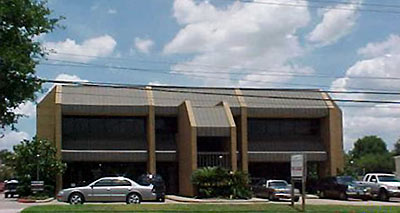MITT ROMNEY’S MISSOURI CITY MORTGAGE Among those who answered the clarion call to invest in Houston-area real estate back in the early eighties, just a few years before its big crash: Presidential candidate Mitt Romney. Long before he earned billions at the helm of Bain Capital, Romney bought 5 rent-to-own houses in suburban areas of Houston — “without putting up any of his own money,” according to Mike McIntire’s report. Romney got stuck renting out the houses until the late 1990s, when he unloaded 4 of them, “mostly at a loss.” The tenants of the fifth house wanted to buy their 1,836-sq.-ft. 3-bedroom home (at 1350 Gentle Bend Dr. in Missouri City’s Hunters Glen neighborhood) but couldn’t qualify for a mortgage. So Romney became their bank. Tim and Betty Stamps have been making out $600 checks to Romney every month for 15 years. They refinanced the property with him this June. [NY Times]
Mortgages

A decade-long scheme of systemic fraud by Houston-based Allied Home Mortgage Capital Corp. cost taxpayers $834 million in insurance claims on defaulted loans and forced thousands of the company’s customers to lose their homes through mortgages that were “doomed to fail,” according to a lawsuit filed by a former branch manager of the company and which the U.S. government officially joined yesterday. Allied Home, which is based in offices at 6110 Pinemont Dr. (above) off the Northwest Fwy. not far from Houston’s new FBI HQ, claims to be the largest privately held mortgage company in the country (99 percent of the company is owned by founder Jim Hodge), with 200 branches, down from a high of 600. Separately, the company has now been suspended from issuing any FHA-backed loans or GNMA-backed mortgage securities.
HOW FAR FROM HOUSTON? David Streitfeld tracks down the foreclosure on a $75,000 Denmark, Maine, house that sparked the recent robo-signing crisis: “Mr. Cox realized almost immediately that Mrs. Bradbury’s foreclosure file did not look right. The documents from the lender, GMAC Mortgage, were approved by an employee whose title was ‘limited signing officer,’ an indication to the lawyer that his knowledge of the case was effectively nonexistent. . . . Fannie Mae and GMAC, which serviced the loan for Fannie, have now most likely spent more to dislodge Mrs. Bradbury than her house is worth. Yet for all their efforts, they are not only losing this case, but also potentially laying the groundwork for foreclosure challenges nationwide.” [NY Times; previously on Swamplot]

Gosh, processing paperwork for foreclosures used to be so easy before the end of last month — when everyone started getting so picky, insisting that agents for the mortgage lenders actually read the documents they were signing. What do they expect? Have you ever tried to wade through all that legalese? And now look what’s come of it: On Friday, Bank of America became the next major lender to call for a time-out, announcing it would halt foreclosures and the sales of foreclosed homes in all 50 states — presumably until the company can figure out its best defense against lawsuits. Yes, that would include all B of A mortgages headed for foreclosure in Texas, where ordinarily courts don’t care whether an agent of the lender has any personal knowledge of the signed documents. Bank of America and its subsidiaries have accounted for 31 percent of all Harris County foreclosures so far this year, according to data dug up by Chronicle reporter Nancy Sarnoff.
Also getting in on the break: Litton Loan Processing Services, a division of Goldman Sachs. The Houston company announced Friday it would also stop pushing through foreclosure paperwork — though only in “certain cases.” Next to be held up in the paperwork traffic pile-up: title insurers. A statement released by the company tries to spin it in a different direction, but the AP reported Friday that an internal memo issued by Houston’s Stewart Title would “make it difficult” for the company’s agents to issue insurance policies for properties foreclosed on by Bank of America and other quick-signing lenders: JP Morgan Chase, OneWest Bank and the GMAC Mortgage unit of Ally Financial.
- Ally’s mortgage documentation problems could extend beyond 23 states [Washington Post]
- Bank of America puts sales on hold [Houston Chronicle]
Photo of Bank of America Center: Erin Ferguson
NO MONEY DOWN — FOR DOCTORS Who’s still able to get jumbo mortgages from banks with no down payment required? Why, borrowers in “lucrative professions” of course, explains Nancy Sarnoff. She profiles a CPA and a tax attorney who were recently offered a million-dollar loan with no money down and no mortgage insurance requirement — from BBVA Compass — to help them purchase their West University home. Among the more prized groups for such “professional mortgages”: doctors and dentists. Such programs are often targeted toward cash-poor graduates just out of medical school, and don’t take student loan payments into account.” [Houston Chronicle]
THE CASE OF THE UNUSUALLY HELPFUL CONTRACTOR Melvin Lendall Brown, owner of a local unincorporated business he called Brownstone Construction, provided an unusually complete range of services to his clients. The Justice Dept. announced his guilty plea — to a single count of wire fraud — earlier this week: “Brown and others recruited and solicited individuals with good credit to act as borrowers in applications for residential mortgage loans to purchase one or more of those properties, even though the borrowers had no intention of making payments on the mortgage loans. Brown, aided and abetted by at least one other person, made representations to each borrower, including that he would buy the home in the borrower’s name, make any monthly mortgage payments, find others to live in the home and pay monthly rent, take the home out of the borrower’s name after a period of time as well as compensate the borrower. Brown and others caused Uniform Residential Loan Applications to be made in the names of the borrowers that overstated their employment income and other assets, understated or omitted their debts and other liabilities, falsely represented that the borrowers leased the homes in which they resided and received income from the rent, and falsely claimed that the borrowers intended to occupy the newly purchased homes. Because of the fraudulent information, the lenders made decisions to approve the applications and fund the loans. In support of those fraudulent loan applications, false and fraudulent documents were submitted, including sham lease agreements and bogus employment information. Brown also provided funds to the borrowers to use for deposits toward the purchases of those homes and for closing fees, and he often appeared with the borrowers at the closings.” [FBI Houston, via InSite]
It’s not just a burgeoning problem that’s destroying neighborhoods and creating havoc in the real-estate market: Mortgage fraud is now also the target of over-the-top TV-show parodies. Yes, “FSI: Fraud Scheme Investigation” is . . . a training video for bored mortgage professionals — or anyone who’s suspicious (or wants to be) that he may be surrounded by unlawful real-estate hijinx.
But really, “FSI” is so much more than that. Designed for “maximum employee learning retention,” the DVD has been a runaway hit for Interthinx, a company that ordinarily provides risk mitigation and compliance tools for the financial-services industry, but occasionally breaks out of that mold to film comedy-dramas like this or its predecessor, “Desperate House Lies.”
But wait, there’s more!
[youtube:http://www.youtube.com/watch?v=iLqkHr77N0U 400 330]
So the actors aren’t likely to win any awards, but this new video posted to YouTube by Tremont Tower owner-victim-gadfly Heather Mickelson is notable for it’s uh . . . stirring illustration of the connection between construction-quality complaints and foreclosure train wrecks.
The Tremont is colorfully renamed “LemonTree Tower” in the video reenactment. If you’re new to the story, you’ll find better introductions to the sordid Montrose condo tale elsewhere. But if you’ve ever wondered why foreclosures seem to gather like flies around new developments that feature questionable levels of quality (and, say, water-tightness), this will make pretty good internet theater. No, the mortgage defaults aren’t the work of the millions of mold spores and the grim reaper, who together make cameo appearances in the video; they’re the ultimate result of the surefire sales techniques employed for undesirable properties — made so much easier, of course, by the subprime-mortgage boom.
Here’s the formula: Building with bad enclosure + poor disclosure = lots of foreclosure. Or just watch the video. At just over seven minutes, it’s still a lot shorter than Glengarry Glen Ross.
- LemonTree Tower [YouTube]
- Ownership Wrongs [Houston Press]
- The Dirty Little Secret Behind the Montrose Foreclosure Hump [Swamplot]
- The Collapse of 1342 Rutland [Swamplot]
Washington Mutual may not be closing all of its home-loan centers nationwide, but it sure is getting out of Houston in a hurry. From the Houston Business Journal this morning:
WaMu intends to close five of six home loan centers in the Houston area, affecting 25 employees, a company spokeswoman said Tuesday.
The six centers are:
- Northline Mall, 4400 North Fwy Suite 300 77022
- Gulfgate Mall, 745 Gulfgate Center Mall 77087
- Little York, 121 Little York 77076
- N. Houston II, 14340 Torrey Chase Blvd. Suite 200 77014
- Sugar Land, 16111 Kensington Dr. 77479
- South Houston, 17225 El Camino Real Suite 110 77058
Which will remain?
WaMu is now out of the subprime loan business entirely.
- WaMu’s mortgage woes prompt office closings, layoffs [Houston Business Journal]
[youtube:http://www.youtube.com/watch?v=SJ_qK4g6ntM 400 330]
If you can spare nine minutes and want a lucid explanation of what’s been going on in the mortgage markets, British comedians John Bird and John Fortune explain it all in this video.
- The Long Johns – The Last Laugh – George Parr – Subprime [YouTube; via Paul Kedrosky’s Infectious Greed]
Some individual investors who’ve been using IRA money to invest in mortgages have been cheering as foreclosures have become more common, reports the Wall Street Journal:
No one tracks IRA loan defaults, but experienced individual lenders say it has happened rarely — though they are bracing for an uptick, given the shaky state of the housing market in many areas.
“You don’t want them to pay you,” says Charlie Adams, a Houston investor who has made about 20 mortgage loans through his and his mother’s IRAs in the past 10 years, typically charging 15% interest for one-year loans. “What’s the worst thing that can happen — you wind up owning a house at 70% of its cost?” He lends no more than 70% of a property’s value and charges interest-only payments. More conservative lenders will go no higher than 50%.
With the one foreclosure he’s done, his mother had lent $40,000 to a renovator to refurbish a house worth $85,000. The borrower made 12 months of interest payments, then stopped, and did not make the balloon payment due. Mr. Adams foreclosed on the house, his mother’s IRA spent $14,000 to finish fixing it up, and they sold it in three months for $85,000, he says, adding that he helped his mother’s IRA increase in value to $140,000 from $50,000 in five years.
Great, but you’ll need to make sure you have enough IRA money in reserve to handle this kind of “good fortune”:
For investors, one risk in foreclosing on a house is racking up so many expenses — from legal fees to repair bills — that the IRA runs out of money. If that happens, the IRA owner faces a difficult choice: Get a loan, or close out your IRA and pay any taxes or penalties.
Using a self-directed IRA to fund mortgage or real estate investments can make sense: for a lot of people, an IRA is the largest pool of money available. Self-directed individual-retirement-account companies Entrust, Pensco Trust, and Guidant Financial have seen a dramatic increase in real-estate lending activity within their IRAs, the article reports.
- Investors Use Their IRAs To Make Home Loans [Wall Street Journal]
Remember a month ago, when the Chronicle reported that high-priced homes in Houston were selling well, despite all the problems at the lower end of the market?
Sales of homes priced $500,000 and higher were up 11.7 percent so far this year.
How long will that continue? Rates for jumbo mortgages (currently greater than $417K) and Alt-A loans have risen dramatically in recent weeks, while other rates have dropped, Bankrate reports.
Investors now believe that stated-income borrowers are going to default on their jumbo loans in bigger than previously expected numbers. So they have virtually stopped buying Alt-A and especially jumbo Alt-A mortgages. When lenders can’t sell the loans, they stop offering them to borrowers — or they ration them by jacking up the rates. That’s what happened.
But why are jumbo-mortgage customers being penalized for the actions of the no-doc-loan crowd?
When jumbo mortgages are securitized, the loan pools contain a mixture of mortgages in which borrowers documented their incomes along with mortgages in which borrowers merely stated their incomes, without providing documentation. In other words, they mingle jumbo and Alt-A.
It’s not hard to imagine an effort to unbundle those two loan classes, but don’t hold your breath.

Twenty-five Montrose homes were foreclosed on this month, reports the Houston Business Journal. That’s a huge increase from last July.
[Mike] Weaster, a Realtor with Century 21 Excel Realty, currently has about 45 foreclosed homes in the Montrose area listed for sale.
“There’s been a big time increase — I’ve never seen anything like this,” he says. “It’s something that is so unique to Houston that I can’t even tell my buyers what’s happening.”
What could be the problem? In Houston overall, there was no increase in mortgage foreclosures: 2,090 last July; 2,085 this month. So what is it with Montrose?
Well, here’s a clue:
Many of the foreclosed homes in Montrose have never even been occupied by the homeowner and were instead purchased by investors who apparently weren’t able to sell them, according to Weaster, who says he comes across first-payment defaults in Montrose at least once a week.
Weaster believes speculation investors and bad loans have taken a toll on the trendy neighborhood.
Still stumped? What if you learned that twelve of this month’s foreclosures alone were at the same address? And what if you discovered that the building at that address was the Tremont Tower?
Yeah, that Tremont Tower, at Yupon and Westheimer. The one featured in an article called “Contractors from Hell” in People magazine in 2005. And in the Houston Press. The one the Lemon Lady used to picket.
Does that help explain?
- Montrose housing in state of shock [Houston Business Journal]
- Ownership Wrongs [Houston Press]
- The Lemon Lady Goes to Washington [Swamplot]
Bankrate’s annual survey of home-mortgage closing costs shows Texas has the second-priciest mortgage closing costs of any state. How come? Title insurance and title searches. Texas has the most expensive in the country:
. . . the insurance department sets (or “promulgates”) the rates, with heavy input from the title agencies and insurance companies. Because the state establishes the rates, title companies don’t compete for consumers by offering lower prices.
How do title insurers compete in states where regulators set prices? According to a report issued in April by the Government Accountability Office, “title agents do not market to consumers, who pay for title insurance, but to those in the position to refer consumers to particular title agents, thus creating potential conflicts of interest.” The report says the industry is rife with kickbacks and undisclosed referral fees among title agents, real-estate agents and lenders.
The study showed that title insurance in Houston (the only Texas city polled for the study) averaged $1,185.06 for a $200,000 mortgage, 68 percent higher than the national average of $707.30. Title search costs averaged $305.08, 54 percent higher than the national average of $197.71.
In his blog, report author Holden Lewis adds a personal comment:
As a native of the Lone Star State, I urge my erstwhile neighbors to ask their members of the Lege why they allow the insurance department to get bulldozed by the title insurance industry. Maybe Texas could set a reasonable objective to have the fifth-most expensive title insurance in the country? That’s doable, right? I mean, Texas doesn’t have to be No. 1 in everything. Or maybe the state could force title insurers to compete in a free market — although cartels are pretty good at making a mockery of a market.
- New York has costliest mortgage fees [Bankrate.com]
- Closing costs averages: Texas [Bankrate.com]
- In closing . . . [Mortgage Matters]
Bank of America’s new no-PMI, no-fee mortgage program isn’t all it’s cracked up to be, claims Lending Clarity:
BofA will give you a conforming 30 year fixed rate for 6.25% with 1.001 Points. Wait a minute, points? I thought this was a No Fee loan? Apparently, in BofA’s world, points are not fees.
So how does this quote compare to a typical market deal? No difference.
It may not be common knowledge to consumers. But when putting less than 20% down on a conventional loan, anybody can do a single loan and not pay for mortgage insurance. It’s called lender-paid mortgage insurance. Rather than collecting a premium for a third party MI company, the lender charges a higher interest rate and self-insures against the potential loss. It just isn’t used much because mortgage insurance is temporary and the higher rate is permanent.
- The Truth About the BofA No Fee Mortgage Plus loan [Lending Clarity]
- BofA waives private mortgage insurance on ‘no-fee’ loan [Inman News]

